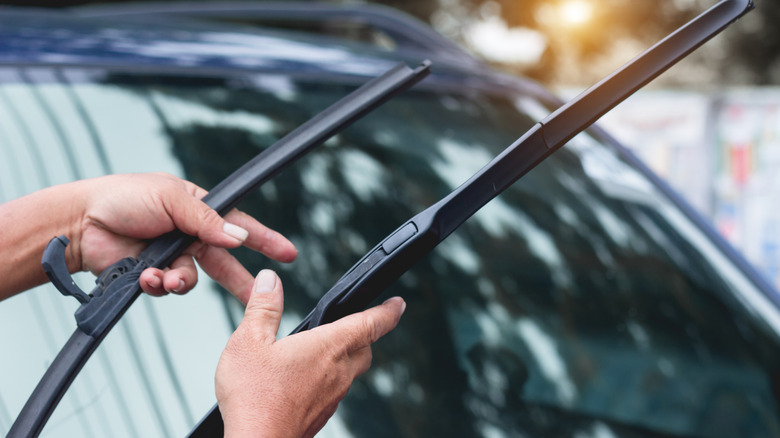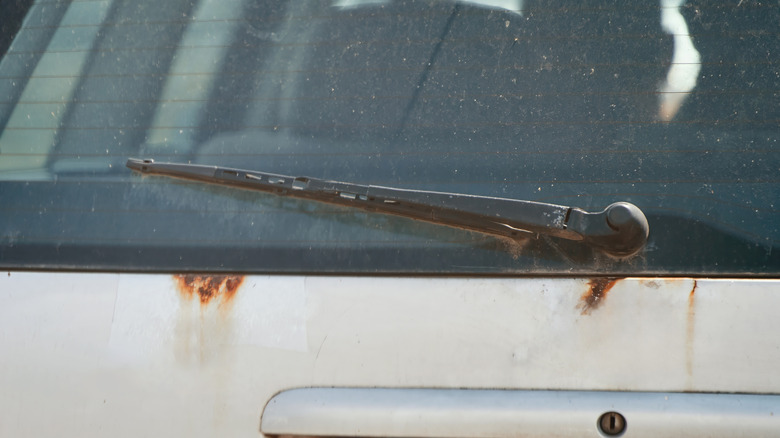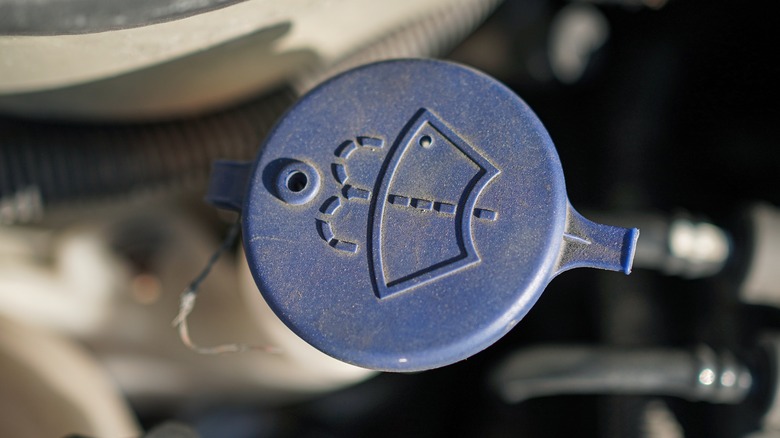How To Maintain Your Windshield Wiper Blades To Ensure They Last
For the uninitiated, DIY maintenance of cars, SUVs, and trucks can be intimidating. However, there are some simple routine maintenance tasks most motorists can handle in their driveway with little to no automotive knowledge. One of the easiest is keeping windshield wipers in good condition. While it's not too difficult nor time-consuming to replace a car's windshield wipers, it's not something you want to do all the time. Like any part, and vehicles as a whole, you want to get the most out of your wipers through proper maintenance and care.
In the case of wiper blades, it all starts with picking the right ones. Like the old saying goes, you get what you pay for, so you don't want to buy from the cheapest, absolute bottom of the barrel brand. More than likely, you'll end up replacing them at a much quicker pace. If you don't have the funds to go for a high-end set, it's a good idea to land somewhere in the middle. Brands such as Rain-X and Michelin come highly recommended by a great number of drivers. Just as important as the brand is the size, since going with blades that are too small leads to a lack of wiper performance, while overly large blades can quickly get damaged, harm the wiper motor, and leave streaks behind because they don't conform to the windshield.
Once you have your wipers, extended maintenance can begin. From here, responsible use and cleanliness should be your top priorities.
Cleaning and replacing your wipers
So long as you don't opt for cheap, poorly made wipers, they should last you a good long while. On average, you can expect to get between six months to a year or so out of a decent pair, so long as they're not used irresponsibly or are damaged in some way. With that said, improper use can cause them to deteriorate far quicker than that, sending you back to the store for a new set. Examples of improper use include using them beyond their effective lifespan and not cleaning your wipers regularly. Though the latter isn't something most do, it's a good habit to get into, for the sake of longevity.
Whether it's dirt, road salt, or bird droppings, a lot can get into your wiper blades, damaging them and diminishing their effectiveness. A simple cleaning technique can remedy this, and it doesn't take much. All you have to do is mix up some wiper fluid or cleaning detergent in warm water, lift the wiper blades from the windshield, and use a soft rag to gently wipe off any stuck dirt and grime. You can use a soft brush to remove especially stubborn debris. You could even use rubbing alcohol, a home staple that can get your streaky blades cleaning like new again. It's best to do all of this at the start of spring and winter, and throughout the summer months as needed. This way, you know for sure your wipers are operating at their best.
Aside from cleaning, you want to be mindful of the environment your wipers are in. Otherwise, premature degradation is sure to occur.
Don't subject your wipers to rough conditions
Unfortunately, a lot of factors out of one's control can damage your wipers. Hot, arid climates can do a number on the rubber blades, while frequent drives in snowy and icy conditions can result in tears along the blade edge. Wipers are generally fairly durable, but frequent exposure to extreme weather will harm them over time. Similarly, prolonged, direct exposure to the sun's UV rays will cause wipers to break down quickly. If possible, you should keep wipers out of direct sunlight as much as possible to prevent cracking. So, park in a garage or the shade, especially on sunny days.
Being mindful of the condition of your windshield is important as well. If it's dry, it's not a good idea to run the wipers too much due to abrasion, which will wear them down. If there's a layer of ice on the windshield, make sure to scrape it off before running the wipers. Failure to do so will result in excess friction, thus damaging the blades. Additionally, as great as it is at preventing streaking and getting grime off a windshield, windshield wiper fluid can harm wiper blades. Store-bought wiper fluid often contains ethylene glycol, which is known to damage plastic and rubber. Therefore, relying on it too much can dry out and ruin the blades. With that in mind, DIY windshield wiper fluid could be worth a shot.
Windshield wipers can endure a lot, but even the best will break down with regular use. To get the most out of wipers and the money you pay for them, be sure to take care of them as best as possible.


